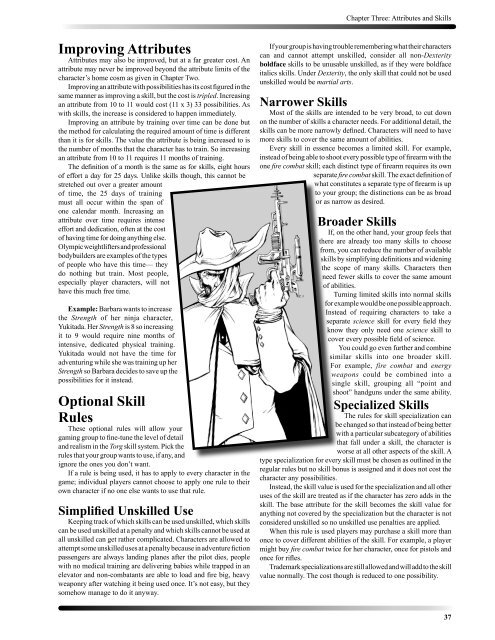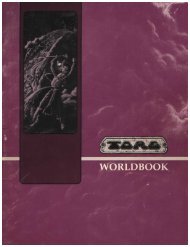Torg Player Rules
Torg Player Rules
Torg Player Rules
You also want an ePaper? Increase the reach of your titles
YUMPU automatically turns print PDFs into web optimized ePapers that Google loves.
Improving Attributes<br />
Attributes may also be improved, but at a far greater cost. An<br />
attribute may never be improved beyond the attribute limits of the<br />
character’s home cosm as given in Chapter Two.<br />
Improving an attribute with possibilities has its cost figured in the<br />
same manner as improving a skill, but the cost is tripled. Increasing<br />
an attribute from 10 to 11 would cost (11 x 3) 33 possibilities. As<br />
with skills, the increase is considered to happen immediately.<br />
Improving an attribute by training over time can be done but<br />
the method for calculating the required amount of time is different<br />
than it is for skills. The value the attribute is being increased to is<br />
the number of months that the character has to train. So increasing<br />
an attribute from 10 to 11 requires 11 months of training.<br />
The definition of a month is the same as for skills, eight hours<br />
of effort a day for 25 days. Unlike skills though, this cannot be<br />
stretched out over a greater amount<br />
of time, the 25 days of training<br />
must all occur within the span of<br />
one calendar month. Increasing an<br />
attribute over time requires intense<br />
effort and dedication, often at the cost<br />
of having time for doing anything else.<br />
Olympic weightlifters and professional<br />
bodybuilders are examples of the types<br />
of people who have this time— they<br />
do nothing but train. Most people,<br />
especially player characters, will not<br />
have this much free time.<br />
Example: Barbara wants to increase<br />
the Strength of her ninja character,<br />
Yukitada. Her Strength is 8 so increasing<br />
it to 9 would require nine months of<br />
intensive, dedicated physical training.<br />
Yukitada would not have the time for<br />
adventuring while she was training up her<br />
Strength so Barbara decides to save up the<br />
possibilities for it instead.<br />
Optional Skill<br />
<strong>Rules</strong><br />
These optional rules will allow your<br />
gaming group to fine-tune the level of detail<br />
and realism in the <strong>Torg</strong> skill system. Pick the<br />
rules that your group wants to use, if any, and<br />
ignore the ones you don’t want.<br />
If a rule is being used, it has to apply to every character in the<br />
game; individual players cannot choose to apply one rule to their<br />
own character if no one else wants to use that rule.<br />
Simplified Unskilled Use<br />
Keeping track of which skills can be used unskilled, which skills<br />
can be used unskilled at a penalty and which skills cannot be used at<br />
all unskilled can get rather complicated. Characters are allowed to<br />
attempt some unskilled uses at a penalty because in adventure fiction<br />
passengers are always landing planes after the pilot dies, people<br />
with no medical training are delivering babies while trapped in an<br />
elevator and non-combatants are able to load and fire big, heavy<br />
weaponry after watching it being used once. It’s not easy, but they<br />
somehow manage to do it anyway.<br />
Chapter Three: Attributes and Skills<br />
If your group is having trouble remembering what their characters<br />
can and cannot attempt unskilled, consider all non-Dexterity<br />
boldface skills to be unusable unskilled, as if they were boldface<br />
italics skills. Under Dexterity, the only skill that could not be used<br />
unskilled would be martial arts.<br />
Narrower Skills<br />
Most of the skills are intended to be very broad, to cut down<br />
on the number of skills a character needs. For additional detail, the<br />
skills can be more narrowly defined. Characters will need to have<br />
more skills to cover the same amount of abilities.<br />
Every skill in essence becomes a limited skill. For example,<br />
instead of being able to shoot every possible type of firearm with the<br />
one fire combat skill; each distinct type of firearm requires its own<br />
separate fire combat skill. The exact definition of<br />
what constitutes a separate type of firearm is up<br />
to your group; the distinctions can be as broad<br />
or as narrow as desired.<br />
Broader Skills<br />
If, on the other hand, your group feels that<br />
there are already too many skills to choose<br />
from, you can reduce the number of available<br />
skills by simplifying definitions and widening<br />
the scope of many skills. Characters then<br />
need fewer skills to cover the same amount<br />
of abilities.<br />
Turning limited skills into normal skills<br />
for example would be one possible approach.<br />
Instead of requiring characters to take a<br />
separate science skill for every field they<br />
know they only need one science skill to<br />
cover every possible field of science.<br />
You could go even further and combine<br />
similar skills into one broader skill.<br />
For example, fire combat and energy<br />
weapons could be combined into a<br />
single skill, grouping all “point and<br />
shoot” handguns under the same ability.<br />
Specialized Skills<br />
The rules for skill specialization can<br />
be changed so that instead of being better<br />
with a particular subcategory of abilities<br />
that fall under a skill, the character is<br />
worse at all other aspects of the skill. A<br />
type specialization for every skill must be chosen as outlined in the<br />
regular rules but no skill bonus is assigned and it does not cost the<br />
character any possibilities.<br />
Instead, the skill value is used for the specialization and all other<br />
uses of the skill are treated as if the character has zero adds in the<br />
skill. The base attribute for the skill becomes the skill value for<br />
anything not covered by the specialization but the character is not<br />
considered unskilled so no unskilled use penalties are applied.<br />
When this rule is used players may purchase a skill more than<br />
once to cover different abilities of the skill. For example, a player<br />
might buy fire combat twice for her character, once for pistols and<br />
once for rifles.<br />
Trademark specializations are still allowed and will add to the skill<br />
value normally. The cost though is reduced to one possibility.<br />
37



